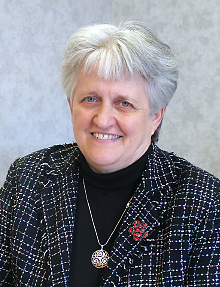As the first psychiatrist to helm the New York State Office of Mental Health (OMH) in nearly 30 years, Ann Sullivan, M.D., is poised to address the concerns and needs of her medical colleagues and their patients in the Empire State.
That is not to say she doesn’t face critical challenges in the years ahead, as the funding environment shifts sharply, bringing changes in the ways psychiatrists practice and patients use services.
New York Gov. Andrew Cuomo (D) appointed Sullivan as acting commissioner in July 2013, and she took office in November. Her nomination is subject to confirmation by the New York Senate during the next legislative session. At press time, Sullivan was still acting commissioner.
It is in gradual yet significant steps throughout her career, she told Psychiatric News, that she prepared herself for her role as the leader of one of the nation’s largest mental health systems.
It all began with her psychiatry rotation in medical school, which “was the most interesting thing I had ever done,” she recalled. “I loved talking to patients and hearing their stories.”
Community psychiatry was burgeoning during her psychiatry residency, which was at Bellevue Hospital Center from 1974 to 1978. In addition to the inpatient unit, there was a community residence, rehabilitation programs, and prevocational programs—“an intense continuum of services for patients at Bellevue had been arranged over the years that I had not seen elsewhere in medicine, and I found it fascinating.”
Administrative Experience Valuable
Sullivan experienced her first taste of psychiatry administration as chief resident, and later became medical director of Ambulatory Care Services at Gouverneur Health Services Diagnostic and Treatment Center, a community-based mental health center that provided a broad array of services to adults and families on Manhattan’s Lower East Side. As medical director, Sullivan helped facilitate the referral process so that patients’ primary care needs were also met. “This is where I first became interested in the interconnection between general medicine and psychiatry,” she noted.
She moved on to become director of psychiatry at Elmhurst Hospital in Queens, where she established extensive Latino and Asian inpatient and outpatient services for the large immigrant community served by the hospital.
In her final role prior to being appointed acting commissioner, Sullivan was senior vice president for the Queens Health Network of the New York City Health and Hospitals Corporation, where she oversaw services provided by Elmhurst and Queens hospital centers.
As acting commissioner, Sullivan will oversee a plan to move patients with serious and persistent mental illness from Medicaid fee-for-service plans to Medicaid managed care plans that will provide integrated care—both psychiatric and general medical, she said. For those with the most serious mental illnesses, Sullivan noted, there will be “health and recovery services,” which would extend above and beyond traditional treatment to cover peer supports, crisis intervention, employment readiness, and social skills training. She emphasized that “this is a statewide initiative—other states are trying to do this county by county, but we are unfolding this initiative as a state.”
Outpatient Services to Be Bolstered
Yet another major initiative to trim excess health care costs will affect mental health practitioners and patients alike: beginning in July, Sullivan will start reducing the number of inpatient psychiatric beds across the state by approximately 400 so that there will be about 2,900 beds available. “Governor Cuomo has given us funding up front so that we can establish services before we start lowering the number of beds,” Sullivan noted. The $25 million Sullivan receives this year will be invested in outpatient services such as home-based crisis intervention for children, supportive housing, mobile intervention teams, crisis respite beds, and basic clinic services, she said.
Innovation Drives Center’s Education Efforts
To promote the widespread use of evidence-based practices, the New York State Office of Mental Health (OMH) and Columbia University’s Department of Psychiatry in 2007 established the Center for Practice Innovations (CPI) at Columbia Psychiatry and the New York State Psychiatric Institute.
Acting OMH Commissioner Ann Sullivan, M.D., praised the agency’s collaboration with Columbia to disseminate the evidence-based practices to providers in the state (see article above).
As part of this collaboration, the CPI features five initiatives that provide training in mental health and substance use disorders called Focus on Integrated Treatment, Assertive Community Treatment, Supported Employment via Individual Placement and Support, Wellness Self-Management, and First Episode Psychosis. There are also training initiatives on best practices with clozapine use, suicide prevention, and tobacco dependence.
According to Lisa Dixon, M.D., a professor of psychiatry at Columbia University Medical Center and director of the CPI, each initiative is taught using computerized modules, of which there are approximately 50. “We have shifted to think about how to train a new workforce using different learning strategies with these innovative methods,” she told Psychiatric News.
Each of the computerized modules uses video presentations of people describing their experiences with recovery, for instance, or features clinical vignettes, interactive exercises, or knowledge checks for providers. Each initiative also features its own group of modules, and some target different audiences, including psychiatrists, psychologists, social workers, substance abuse counselors, and consumers, for instance.
According to Dixon, the collaboration between Columbia and OMH is mutually beneficial. “The public sector draws expertise from academia, and academia learns from best practices that emerge within the public sector. It is a very synergistic relationship.”
She acknowledged that psychiatrists, nurses, and others who had been accustomed to working on inpatient units may have to adjust their clinical skills to adapt to the changing environment, but there are learning tools to aid them—the New York State OMH and Columbia University’s Department of Psychiatry established the Center for Practice Innovations in 2007 to promote the widespread use of evidence-based practices throughout New York state for this purpose (see box).
Sullivan and her team are also trying to find a solution to a mental health workforce shortage in New York, she said. “We have real problems with psychiatric coverage in the northern part of the state.” OMH has formed a number of partnerships to ameliorate the problem. For instance it has collaborated with the American Academy of Pediatrics, the New York State Chapter of the American Academy of Family Physicians, and the Conference of Local Mental Hygiene Directors to establish Project TEACH, which provides consultation, education, and referral to primary care physicians statewide to provide care for children and adolescents with mental disorders.
APA Connections Forge Dialogue
Sullivan has for many years played an active role in APA and is a past speaker of the Assembly, former member of the Board of Trustees, and is on the Psychiatric News Editorial Advisory Board. She has also been active in the New York State Psychiatric Association (NYSPA) as treasurer, so Sullivan—as mental health commissioners have done before her—met with NYSPA leadership in March “to see how we can work together to foster mental health in New York.” However, noted Seeth Vivek, M.D., president of the NYSPA, this meeting was somewhat different.
“It was a pleasure to meet with Commissioner Sullivan,” he told Psychiatric News. Vivek explained that it had been difficult to convey to previous commissioners who weren’t psychiatrists what issues were important to the practice of psychiatry. “Commissioner Sullivan has worked in the trenches, so she understands what it is like to work in a psychiatric ER, for instance.”
Together with Sullivan, NYSPA leadership tackled an agenda involving obstacles to access to care for patients receiving treatment in the public sector, and they have agreed to ongoing meetings, Vivek noted.
Sullivan has been meeting with other administrators and provider groups as well to describe OMH initiatives and what the office hopes to accomplish. She also makes time to see long-term patients at the New York State Psychiatric Institute. “I continue to see them because I have known them for so many years,” she said.
“I would really encourage young psychiatrists to consider work in the public sector,” she added “This is a wonderful career, and there are a multitude of opportunities—whether working as a team leader on a crisis unit, or working as an administrator, or setting policy. . .this is very exciting work.” ■

